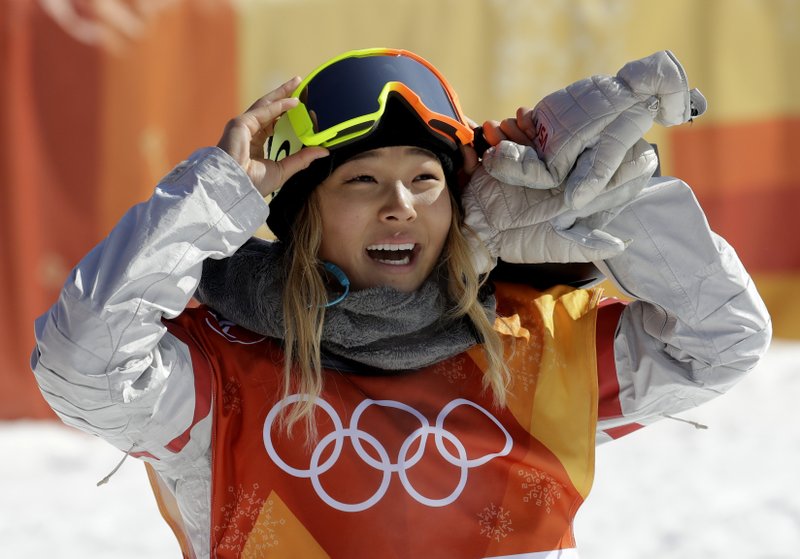
By PAUL NEWBERRY, AP
GANGNEUNG, South Korea — They had their moments, without a doubt.
From a nerve-wracking victory in women’s hockey to the fun-loving guys over at the curling sheet to Shaun White’s spiraling run of redemption, the American athletes gave the folks back home some compelling reasons to stay up to all hours of the night.
Yet there were far more times when flipping the channel was the better option.
No amount of soaring visuals or tear-jerking features or hokey patriotism could gloss over this reality: Team USA did not live up to expectations at the 2018 Winter Olympics.
The flame was set to be doused Sunday night on a games that produced nine golds but only 23 medals overall, which represented the country’s lowest output since 1998 and, more perplexing, far below the U.S. Olympic Committee’s own target.
If not for those shredders out at the snowboard mountain, who accounted for nearly half the golds (four) and seven medals in all, these Olympics would’ve been a total flop for the Americans.
Someone’s got some ’splaining to do.
They should start with whoever came up with that full-screen slide, presented to the USOC last year, projecting the Americans would take a minimum of 25 medals, set a supposedly realistic target of 37, and even threw out the laughable possibility of making off with 59 if absolutely everything went according to plan (and, presumably, a bunch of nations didn’t show up).
Short of persuading the international blue bloods to come up with a few more sports Americans might be good at — snow basketball, anyone? — there are some serious areas of concern that must be addressed right away.
Hey, the clock is already ticking on Beijing.
Speedskating might be the biggest trouble spot, especially since it’s produced more U.S. winter medals than any other, but women’s figure skating and men’s Alpine skiing aren’t far behind.
All were underachievers in Pyeongchang.
Long-track speedskating made off with a single bronze, when it was projected to win at least three medals and had a target of four. While the powers-that-be wisely stayed away from the game plan that produced a Sochi shutout — hey, let’s train beforehand in totally different conditions than the Olympics and break in a new suit that actually makes us slower — the results were only marginally better.
Some of the explanations were downright bizarre, such as Joey Mantia’s take after he came up about a second short of a bronze medal in the mass start. Remember, this is the guy who was reigning world champion.
“I, ultimately, didn’t train hard enough or specific enough for this event,” he said.
In what might have been the final Olympics of his brilliant career, Shani Davis didn’t have anything to say at all. He blew off the media by slipping out a back door, having produced finishes of seventh and 19th in South Korea.
The future doesn’t look all that bright, either. With hardly anyone taking up the sport through traditional paths, speedskating has relied heavily on former inliners to keep up with the world. This team included four skaters from Florida and two others from North Carolina, all of whom crossed over from wheels to blades.
But the U.S. is no longer a dominant inline force on the world stage, so that farm system could be drying up.
Then there’s figure skating, the sport that largely drives the NBC gravy train. It was held to a pair of bronze medals in Pyeongchang (which, in fairness, was just one shy of its USOC target) and has fallen completely off the map on the women’s side.
Fallen being the operative word.
Mirai Nagasu, Karen Chen and Bradie Tennell all went down in the short program on the way to finishing ninth, 10th and 11th. What a tumble for the nation that produced seven gold medalists in women’s figure skating from 1952 in Oslo to 2006 in Turin.
Russia and Japan are now the countries to beat. That doesn’t seem likely to change anytime soon since those two are also dominating at the world junior level, which usually serves up the next generation of gold medalists.
With Lindsay Vonn and Ted Ligety likely on the way out, Alpine skiing is heading for a major changing of the guard after winning only one gold and three medals at these games.
That was the fewest U.S. victories since 2002, the fewest podium finishes since 2006. The USOC had targeted four medals and the national governing body totally missed the mark, hoping for seven.
Ligety’s fifth-place showing in the combined was the only top 10 from the men in the individual events.
“We know we have to go into a rebuilding phase and develop some young skiers,” U.S. Alpine director Patrick Riml said. “Hopefully next time around, we can be competitive and perform on a high level.”
Yep, there were some must-see moments for American at these Olympics.
Just not nearly enough.










